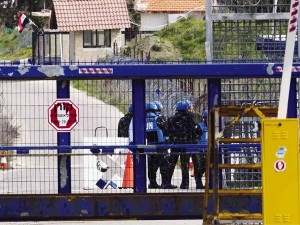Abduction shows vulnerability of UN force

HEIGHTS OF AUDACITY Filipino UN peacekeepers cross the Quneitra checkpoint between Israel and Syria in the Golan Heights on Friday. The Philippines said that rebels who are holding 21 Filipino peacekeepers hostage in the Golan Heights are insisting that Syrian government troops leave the area before releasing their captives. AFP
BEIRUT, Lebanon—New video on Thursday of United Nations peacekeepers held captive by Syrian rebels illustrates the sudden vulnerability of a UN force that had patrolled a ceasefire line between Israel and Syria without incident for nearly four decades.
The abduction of the Filipino troops—soft targets in Syria’s civil war—also sent a worrisome signal to Israel about the lawlessness it fears along the shared frontier if Syrian President Bashar Assad is ousted.
The 21 peacekeepers were seized on Wednesday near the Syrian village of Jamlah, just a mile from the Israeli-controlled Golan Heights, a plateau Israel captured from Syria in 1967.
Speaking in Manila, a Philippine military spokesperson said on Friday that the rebels were willing to release the peacekeepers and were asking for the International Committee of the Red Cross to escort them to a safe area.
He said the information came from the UN command.
The peacekeepers’ abduction highlights the growing risks to UN staff in Syria’s escalating conflict.
Fighting has spread across the country, claiming more than 70,000 lives and displacing nearly 4 million of Syria’s 22 million people. There is no sign of a breakthrough for either side, though rebels have scored some recent gains on the battlefield and in the diplomatic arena.
Israel has said it’s trying to keep out of the Syria conflict, but is watching the disintegration of the country with growing concern.
In recent months, Syrian mortars overshooting their target have repeatedly hit the Israeli-controlled Golan. In Israel’s most direct involvement so far, Israeli warplanes struck inside Syria in January, according to US officials who said the target was a convoy carrying anti-aircraft weapons bound for Hezbollah, a Lebanese militia allied with Assad and Iran.
Calls for reexamination
UN diplomats and officials said on Thursday that the capture of the peacekeepers would almost certainly lead to a reexamination of security for the UN force and its patrols in the field.
The UN monitoring mission, known as the United Nations Disengagement Observer Force (Undof), was set up in 1974, seven years after Israel captured the Golan and a year after it managed to push back Syrian troops trying to recapture the territory in another regional war.
For nearly four decades, the UN monitors helped enforce a stable truce between Israel and Syria, making it one of the most successful UN missions in the world, said Timor Goksel, a Beirut-based former senior UN official in the region.
The force has an office in Damascus and staffs observation posts along the armistice line.
‘Soft targets’
Goksel, who works for the Al-Monitor news website, said the observers were “soft targets” in Syria’s increasingly brutal civil war. Up to now they were “never challenged by anybody in Syria,” he added.
The monitors’ success may have been linked to a decision by Assad and his father and predecessor, Hafez Assad, to comply with the armistice deal, including limits on military hardware allowed near the ceasefire line.
Moshe Maoz, an Israeli expert on Syria, said the UN mission’s success was largely due to the Assads’ decision to abide by the truce.
“When you are dealing with an army that follows orders, it is one thing,” Maoz said. “Now you have different groups. They do not recognize international law and have no respect for any law or international morals. They are terrorist groups that know no bounds.”
An Israeli official said that if Undof were to halt operations, it would be a “bad thing for peace.” He spoke on condition of anonymity because he was not authorized to discuss the diplomatically sensitive issue with the media.
